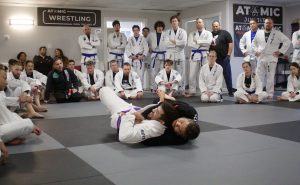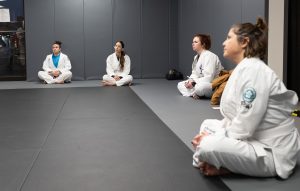The Role of Mental Toughness in Jiu-Jitsu: Strategies to Stay Focused
Atomic Jiu-Jitsu
Written By Faith A Mooney
Jiu-Jitsu has often been described as “physical chess,” where strategy, adaptability, and resilience are just as important as physical prowess. While strength and technique can carry you far, mental toughness and grit is the cornerstone of long-term success in this martial art. Staying focused in Jiu-Jitsu—whether during an intense training session, or a tough competition, is what separates the good from the great. Here, we’ll explore why mental toughness is crucial and share actionable strategies to strengthen it.

Why Mental Toughness Matters in Jiu-Jitsu
- Handling Adversity: Jiu-Jitsu places you in uncomfortable positions—both literally and figuratively. Whether you’re trapped under side-control or facing a highly skilled opponent, mental toughness helps you remain calm and execute a game plan.
- Overcoming Plateaus: Every practitioner hits a point where progress feels stagnant. Mental toughness allows you to push through these phases and continue improving.
- Fighting Fatigue: During long training sessions or intense competitions, physical energy wanes. The ability to focus and persevere despite exhaustion comes down to mental resilience.
- Learning from Failure: Losing a match or getting tapped in sparring can be humbling. Mental toughness transforms these moments into valuable lessons rather than setbacks.
Strategies to Build Mental Toughness in Jiu-Jitsu
1. Develop a Growth Mindset
Adopt the belief that improvement comes through effort and learning, not just natural talent. View challenges as opportunities to grow rather than obstacles. For instance, if you struggle with a specific guard pass, treat it as a chance to refine your technique rather than a limitation.
Actionable Tip: After every class or roll, reflect on one thing you did well and one thing you can improve.
2. Practice Staying Calm Under Pressure
In Jiu-Jitsu, panic is your enemy. Staying calm when you’re mounted or close to being submitted can mean the difference between escaping and tapping. Mental toughness involves training your mind to stay composed in stressful situations.
Actionable Tip: Incorporate breathing exercises into your routine. When you feel overwhelmed on the mat, focus on slow, deep breaths to regain control.
3. Set Incremental Goals
Large goals, like earning a new belt, can feel overwhelming. Break them into smaller, achievable milestones. Mental toughness grows as you consistently hit these targets, building confidence and momentum.
Actionable Tip: Set weekly goals, such as mastering a specific sweep or improving your endurance during rolls. Celebrate each accomplishment, no matter how small.
4. Visualize Success
Mental imagery is a powerful tool for focus and confidence. Before training or competing, visualize yourself performing key techniques successfully. This primes your mind and body for peak performance.
Actionable Tip: Spend five minutes before class picturing yourself executing techniques and remaining calm under pressure.

5. Learn to Embrace Failure
Failure is inevitable in Jiu-Jitsu. You’ll get submitted, make mistakes, and lose matches. Mental toughness is learning to reframe failure as a stepping stone on the road to mastery.
Actionable Tip: After every sparring session, write down what you learned from any mistakes or submissions. This reinforces a constructive and growth mindset.
6. Train Consistently, Even When You Don’t Feel Like It
Discipline is the foundation of mental toughness. Showing up to train when you’re tired, frustrated, or not “in the mood” builds resilience over time.
Actionable Tip: Create a non-negotiable training schedule. Commit to attending class, even on difficult days, unless you’re injured or sick.
7. Surround Yourself with Supportive Teammates
Mental toughness doesn’t mean doing it by yourself. Training partners and coaches can motivate you and push you beyond your perceived limits. Positive reinforcement from others helps you stay focused and confident.
Actionable Tip: Find a training partner who challenges you but also offers constructive feedback and encouragement.
Conclusion
In Jiu-Jitsu, mental toughness is as vital as mastering the perfect armbar or guard pass. The ability to stay focused under pressure, push through adversity, and continuously improve is what defines successful Jiu-Jitsu athletes. By cultivating a growth mindset, staying calm under pressure, and embracing challenges, you can develop the mental toughness needed to thrive both on and off the mats.
Remember, Jiu-Jitsu is a journey—not a destination. With the right mindset and strategies, you’ll not only sharpen your skills but also grow stronger mentally, allowing you to face challenges head-on and come out stronger every time.

